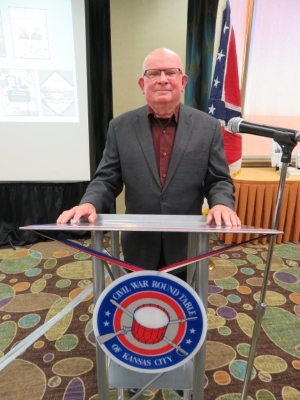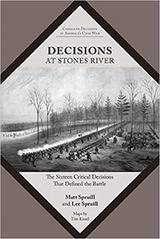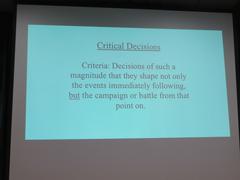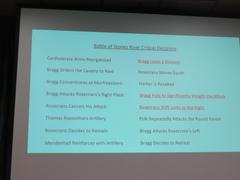
At our dinner meeting held on October 23rd, Matt Spruill, retired U. S. Army colonel and Civil War historian, gave an interesting presentation about his new book, Decisions at Stones River: The Sixteen Critical Decisions That Defined the Battle. The following is a summary of Mr. Spruill's presentation:
- The Battle of Stones River took place on December 31, 1862 and January 2 and 3, 1863, near Murfreesboro TN. Confederate General Braxton Bragg commanded the Army of Tennessee. Union General William S. Rosecrans commended the Army of the Cumberland.
- The battle did not happen as a result of random chance. Events occurred as they did because of the decisions made at all levels of command on both sides. Some decisions were normal ones that were made during any campaign or battle. Others were more important. A limited number of critical decisions shaped the way the campaign and battle unfolded.
- Critical decisions are those very few decisions that had a major impact on the battle. They not only affected the events that immediately follow, but the course of the battle from that point on. Had they not been made, the Battle at Stones River would have been different from the one we know today.
The sixteen critical decisions for the Battle of Stones River can be grouped into three specific time periods:
- Before the battle.
- When the armies collided on December 31, 1862.
- When the battle continued on January 2-3, 1863.
Matt focused his talk on the following three critical decisions:
- Bragg loses a division. Stevenson's division under Kirby Smith was sent to reinforce Pemberton in Mississippi. This weakened Bragg's combat strength for the attack on December 31, 1862.
- Bragg fails to significantly weight the main attack. Bragg decided to allocate two divisions to the main attack, two divisions to the supporting attack, and one division to protect the army's right.
- Rosecrans shifts units to the right. Rosecrans decided to send Rousseau's division to Sheridan’s right and directed additional units to the far right as they became available, in order to meet the main Confederate attack on December 31, 1862.
Spruill's talk was adapted from his recent book, Decisions at Stones River: The Sixteen Critical Decisions That Defined the Battle (Command Decisions in America’s Civil War), coauthored with his son, Lee Spruill. The following description comes from Amazon's listing for the book.
 From December 31, 1862, to January 2, 1863, the Army of the Cumberland and Army of Tennessee fought a bloody battle along Stones River. Led by Major General William S. Rosecrans, Union forces would eventually emerge victorious. Coming at the end of a series of Union defeats, this victory would give Lincoln and the Northern population a bright ray of hope during a fall and winter of reversals.
From December 31, 1862, to January 2, 1863, the Army of the Cumberland and Army of Tennessee fought a bloody battle along Stones River. Led by Major General William S. Rosecrans, Union forces would eventually emerge victorious. Coming at the end of a series of Union defeats, this victory would give Lincoln and the Northern population a bright ray of hope during a fall and winter of reversals.
Decisions at Stones River introduces readers to critical decisions made by Confederate and Union commanders. Matt Spruill and Lee Spruill examine the decisions that shaped the way the campaign and battle unfolded. Rather than offering a history of the Battle of Stones River, the Spruills focus on the critical decisions, those decisions that had a major impact on both Federal and Confederate forces in shaping the progression of the battle as we know it today. This account is designed to present the reader with a coherent and manageable blueprint of the battle’s development. Exploring and studying the critical decisions allows the reader to progress from an understanding of “what happened” to “why events happened” as they did.
Complete with maps and a guided tour, Decisions at Stones River is an indispensable primer, and readers looking for a digestible introduction to the Battle of Stones River can tour this sacred ground—or read about it at their leisure—with key insights into why events unfolded as they did and a deeper understanding of the Civil War itself.
Decisions at Stones River is the first in a series of books that will explore the critical decisions of major campaigns and battles of the Civil War
Matt Spruill is a retired U. S. Army colonel and Civil War historian and lecturer. A former Gettysburg licensed battlefield guide he is the author of seven previously Civil War books including most recently Decisions at Gettysburg: The Nineteen Critical Decisions That Defined the Campaign and Winter Lightning: A Guide to the Battle of Stones River, second edition.
Lee Spruill is a retired U. S. Army lieutenant colonel and a combat veteran of the campaign in Afghanistan. He is the author of two previous book, including most recently Winter Lightning: A Guide to the Battle of Stones River, second edition.
Here are some of the photos taken at the meeting.

Austin Turney

Gary Nevius

David Frensley, Blair Hosford, and Dan Turner

James Voelker

Rev. David Holloway

Lane Smith

Speaker Matt Spruill

Presentation slide

Presentation slide

Marlene Natoli, Mary Griffin, Debbi Roy, and Suzee Oberg